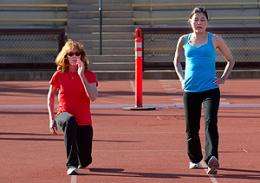Organ recipients stay fit, bond during exercise 'boot camp'

Misty Clyde ran up and down several sets of bleacher stairs at the university’s Cobb Track before pausing to stretch against a handrail. Her new lungs — or, as she sometimes refers to them, her recycled lungs -- were working fine. And she aimed to keep them that way.
It was the last Wednesday of March and the first warm day of spring. Clyde, 28, who got her recycled lungs in 2008, was working out with a half-dozen other organ recipients who meet every week for what they call Transplant Boot Camp. Most had cystic fibrosis, a genetic disease that causes thick mucus to build up in the lungs and digestive tract. All were patients at Stanford Hospital, where they had undergone transplant surgery. They said the boot camp motivates them to exercise.
On this day, the participants, decked out in exercise gear —stretch pants, shorts, T-shirts and tank tops — arrived at the track in ones and twos at about 5 p.m. They stretched, and several took a brisk walk around the track before running some sprints. Members of the group alternately worked out together, as when they got in a circle and threw around a medicine ball, and in smaller groups or individually, doing pushups, sit-ups and lunges and jumping rope, among other routines.
Two decades ago, physicians were leery of recommending much physical activity for new organ recipients. But their doubts have largely been erased in the intervening years as study after study has shown that, for most patients, exercising as soon as a few weeks after a transplant operation can improve cardiopulmonary function and quality of life, as well as counteract some of the side effects of medication. A recent study by Dutch researchers, published online March 3 in the Clinical Journal of the American Society of Nephrology, even found that exercise is linked to increased longevity among kidney-transplant patients.
Stanford Hospital’s David Weill, MD, medical director of the Lung and Heart-Lung Transplant Program and director of the Adult Cystic Fibrosis Center, called himself a “huge advocate” of exercise for his patients. “The lungs are the body’s oxygenator, if you will, and what exercise does is train your muscles to use the oxygen that’s available most efficiently,” said Weill, who is also an associate professor of pulmonary and critical care medicine at the School of Medicine. “That’s a huge benefit, whether or not you’ve had a transplant.”
The first successful lung transplant was performed as part of a combined heart-lung transplant at Stanford Hospital in 1981. The hospital now performs as many as 50 lung transplants each year, putting it in the top 10 percent of the most active lung-transplant centers nationwide. At 94 percent, the hospital also has the highest national one-year survival rate among lung-transplant patients — a commonly used quality measure of lung-transplant programs.
The Transplant Boot Camp at Stanford began as an offshoot of workouts attended by several athletes training for the 2008 U.S. Transplant Games. Two competitors, identical twins Anabel Stenzel and Isabel Stenzel Byrnes, decided last year to organize similar workouts open to all members of the local transplant community. The sisters, who have cystic fibrosis, understand the extra effort it takes for organ recipients to exercise; all must adhere to a regimen of steroids, immunosuppressants and other drugs that impair muscle health. Organ recipients have to work harder than others to build muscle and gain the aerobic benefits of exercise, said Anabel Stenzel, who has had two lung transplants — the first in 2000 and the second 2007. (Her sister had a lung transplant in 2004.) “We were always told that you have to exert twice the effort for half the reward,” she said. But experts say the payoff is worth it.
Weill cited several studies showing that exercise benefits transplant recipients’ quality of life and emotional health. He said many other studies have shown that exercise both before and after lung-transplant surgery tends to make cardiopulmonary function more efficient; strengthen muscles, especially respiratory muscles; and ensure good bone density. However, there is no statistically reliable study showing that exercise can increase the longevity of lung recipients, he said, because of the difficulty of isolating exercise as a single factor influencing survival.
Still, Anabel Stenzel believes exercise is a key factor to enjoying a longer life as a transplant patient. “Everyone I know who has lived 10 years post-transplant is an active exerciser,” she said. “It improves well-being, but maybe more importantly helps decrease the side effects of the medication. I believe exercise is as important as immunosuppression and is not stressed enough by transplant doctors.”
The boot camp also gives organ recipients a chance to share stories and check up on one another. “It’s really about camaraderie,” Stenzel said. “There are people who join us with only 45 or 55 percent lung capacity, and they can do only so much. But we’re all in this together.
“We’re here to do our best,” she added. “We’re not as strong as healthy people, and hanging out with a group that understands that is important. We also feel enormously lucky.
“Apart from the birth of a baby, transplantation is one of the true miracles that happen in a hospital.”
















